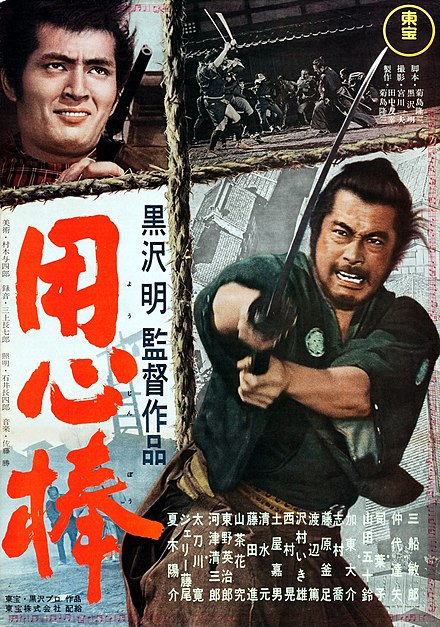
Yojimbo
When a Wandering Samurai Decides to Play Chess with Human Pieces
Ever have that moment when you walk into a town and think, “This place could use a good old-fashioned gang war”? No? Well, meet Sanjuro (Toshiro Mifune), a masterless samurai who does exactly that, though admittedly with more style and a better sword than most of us could manage.
The year is 1860, and our scruffy protagonist wanders into a town that’s about as cheerful as a tax office on April 14th. The first thing he sees is a dog trotting by with a human hand in its mouth. Most people would take this as a sign to try the next town over, but Sanjuro sees it as a career opportunity. Welcome to the world of Akira Kurosawa’s “Yojimbo.”
The town’s situation is more complicated than a corporate org chart. On one side, we have silk merchant Tazaemon and his gang, led by the hot-headed Ushitora, who recently split from his former boss Seibei. On the other side, we have sake merchant Tokuemon and his gang, led by the aforementioned Seibei. Both gangs are about as trustworthy as a chocolate teapot, and caught between them are the town’s few remaining honest citizens, including Gonji, the sake brewery owner who becomes Sanjuro’s primary source of information (and sake).
Our crafty samurai quickly figures out that the best way to clean up this town is to let it get even dirtier first. He approaches Seibei and offers his services as a yojimbo (bodyguard), demonstrating his skills by casually cutting down three of Ushitora’s men. The display is so impressive that both gangs want to hire him, which is exactly what he was counting on.
What follows is a masterclass in manipulation that would make Machiavelli take notes. Sanjuro plays both sides, intentionally leaking information back and forth, driving up his price, and watching as the gangs become increasingly paranoid. He gets hired by Seibei for the princely sum of 25 ryo, only to witness a fascinating display of cheapskate theater as Seibei’s wife suggests paying him after he wins the coming battle (spoiler alert: they never planned to pay him at all).
The plot thickens like a good miso soup when Ushitora’s gang brings in Unosuke (Tatsuya Nakadai), the younger brother who’s been away and has returned with a newfangled pistol. This is the feudal Japanese equivalent of bringing a gun to a sword fight, and it significantly complicates Sanjuro’s plans.
Things really get messy when our antihero helps a kidnapped woman escape back to her family. This act of kindness (his one deviation from calculated self-interest) nearly gets him killed. The gangs discover his double-dealing, and he receives a brutal beating that would have most people considering a career change. Instead, he recovers in hiding, watching as the town descends further into chaos.
The final act is a symphony of violence orchestrated by our now-recovered samurai. Having managed to get the gambling-addicted constable to free a prisoner (which led to said prisoner killing Seibei), Sanjuro sets up the final confrontation. In one of cinema’s most iconic showdowns, he faces off against six men, including the pistol-wielding Unosuke. The scene is a perfect blend of tension, skill, and that special brand of samurai cool that inspired countless filmmakers, including Sergio Leone, who would later remake this film as “A Fistful of Dollars.”
The Verdict
“Yojimbo” is what happens when you take a hardboiled detective novel, dress it in a kimono, and filter it through the genius of Akira Kurosawa. It’s a perfect blend of drama, dark humor, and action that somehow manages to be both deeply cynical and wildly entertaining.
What I Love:
- Toshiro Mifune’s performance as Sanjuro is a masterpiece of subtle expressions and physical presence
- The way Kurosawa frames every shot like a perfect photograph
- The dark humor that runs throughout the film like a bitter thread
- Masaru Sato’s score, which manages to be both playful and ominous
- The intricate plot mechanics that click together like a perfect puzzle
- The influential cinematography that would inspire generations of filmmakers
What Could’ve Been Better:
- Some of the political machinations might be hard to follow on first viewing
- The violence, while artistic, might be too stylized for some modern viewers
- The film’s cynical worldview might be a bit much for those seeking traditional heroics
“Yojimbo” isn’t just a great samurai film; it’s a great film, period. It’s a story that transcends its genre and setting to become something universal – a tale about human greed, corruption, and the occasional need for a mysterious stranger to come to town and clean house. The fact that it manages to be darkly funny while doing all this is just icing on the rice cake.
Rating: 5 out of 5 strategically placed sake cups